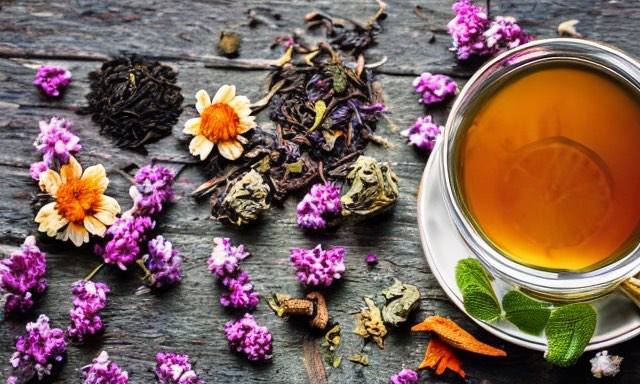Internet Asks: “Does Herbal Tea Have Caffeine?”
Step into the realm of herbal tea, where nature's bounty and comforting flavors converge. As tea lovers seek delightful alternatives to caffeinated beverages, herbal tea emerges as a popular choice. But amidst the allure of herbal blends, a question lingers: Does herbal tea have caffeine? Join us on a flavorful journey as we unravel the secrets behind herbal tea's caffeine content and explore the wondrous world of caffeine-free sipping.
sponsored links

Caffeine-Free Bliss: Unmasking the Herbal Tea Brew
The beauty of herbal tea lies in its caffeine-free nature. Yes, you read it right! Herbal tea, also known as tisane, is a beverage made from infusing various plant parts such as leaves, flowers, seeds, and roots in hot water. Unlike traditional teas derived from the Camellia sinensis plant, herbal teas are naturally caffeine-free. This fundamental distinction sets herbal tea apart as a serene and soothing choice for those seeking a caffeine break.
Embracing the Caffeine-Free Serenity
Herbal teas offer a tranquil respite from the energizing effects of caffeine. As you sip on your favorite herbal blend, rest assured that you are partaking in a caffeine-free indulgence. Whether it's a chamomile infusion to calm your senses, a peppermint blend for refreshing rejuvenation, or a hibiscus elixir to tantalize your taste buds, herbal tea brings a symphony of flavors without the caffeine jitters.
Exploring Herbal Tea's Plethora of Possibilities
Beyond its caffeine-free nature, herbal tea delights in its diverse array of flavors and potential health benefits. Let's explore a few enchanting options that herbal tea brings to your cup:
- Soothing the Soul: Chamomile tea, known for its gentle floral notes, has been cherished for centuries as a relaxing brew that aids in promoting a sense of calm and tranquility.
- Invigorating the Senses: Peppermint tea, with its vibrant and refreshing character, awakens the senses and provides a burst of minty delight that can invigorate your day.
- Nourishing the Body: Rooibos tea, a South African herbal infusion, offers a rich and earthy flavor while providing a range of antioxidants that may support overall well-being.
- Brightening the Palate: Hibiscus tea, with its vibrant crimson hue and tangy flavor, delivers a refreshing burst of tartness that can awaken your taste buds and quench your thirst.
sponsored links
Exploring the Botanical Wonderland
Let's take a closer look at some popular herbal teas and their unique characteristics:
- Chamomile: Known for its calming properties, chamomile tea is a beloved choice for relaxation. Sip on its gentle, floral flavors, and let the worries of the day melt away. Rest easy, as chamomile tea is completely free from caffeine, allowing you to drift off into a serene slumber.
- Peppermint: With its invigorating and refreshing flavor, peppermint tea is a popular choice to soothe the senses. The delightful minty infusion offers a burst of coolness, making it an ideal choice for a caffeine-free pick-me-up at any time of the day.
- Rooibos: Hailing from South Africa, rooibos tea delights with its rich and earthy taste. This caffeine-free herbal tea is packed with antioxidants, promoting overall well-being and providing a comforting escape from the hustle and bustle of everyday life.
- Hibiscus: Vibrant and tangy, hibiscus tea offers a burst of tropical flavors. This caffeine-free infusion is celebrated for its refreshing nature, making it a delightful choice for a cooling iced tea on a sunny day.
A Caffeine-Free Haven
Herbal tea offers a sanctuary for those who wish to avoid the stimulating effects of caffeine. It provides an opportunity to unwind, relax, and revel in the natural goodness of plants. Whether you enjoy a cup in the morning to start your day on a peaceful note or sip it in the evening to wind down before bed, herbal tea embraces you in a caffeine-free haven.
Conclusion
Herbal tea, with its caffeine-free allure and a myriad of flavors, opens the door to a serene and soothing beverage experience. It invites you to explore the richness of nature's bounty and indulge in a comforting cup that aligns with your caffeine preferences. So, as you embrace the world of herbal tea, savor each sip with the knowledge that you have found a tranquil escape from caffeine's grasp. Raise your teacup and celebrate the joys of herbal tea—a delightful and caffeine-free elixir that nourishes both body and soul. Cheers to the serene pleasures of herbal bliss!
Disclaimer: The information provided in this article is for educational and informational purposes only. It is not intended as a substitute for professional medical advice, diagnosis, or treatment. Always consult with a qualified healthcare professional before making any dietary changes or incorporating herbal teas into your routine, especially if you have specific health conditions or are taking medications that may interact with certain herbs. The caffeine content in herbal teas may vary depending on the specific ingredients and processing methods used.
sponsored links
References
-
- Harvard School of Public Health. Caffeine. https://www.hsph.harvard.edu/nutritionsource/caffeine/
- Garfield Medical Center. Different Types of Tea and Caffeine Content. https://www.garfieldmedicalcenter.com/GMC-Blog/2016/October/Different-Types-of-Tea-and-Caffeine-Content.aspx
- Good Life Tea. Teas vs Tisanes. https://www.goodlifetea.com/blogs/news/what-is-a-tisane#:~:text=Tisanes%20(pronounced%20ti%2Dzahn),and%20spices%20of%20other%20plants
- Dr. Axe. Herbal Tea Benefits + How to Make at Home. https://draxe.com/nutrition/herbal-tea-benefits/
People are also reading...
Does Sprite Have Caffeine?
Calories In Steak?
Chicken Taco Calories?
Does Hot Chocolate Have Caffeine?
Are Carrots Acidic?
Are Mangoes Acidic?
Orange Juice pH?
Does Kahlua Have Caffeine?
Calories In a Grilled Cheese?
Is Watermelon Acidic?
6 oz Steak Calories?
Are Strawberries Acidic?
Ready to level-up?
Create meal plans 10x faster, follow up with your clients through our mobile app, and never struggle with meal planning or recipe management again.